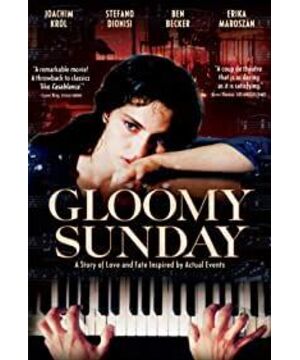Although I had heard of the film Budapest Love, it was completely unconnected to the song Gloomy Sunday; the bizarre tale of the suicide song has always been fresh in my memory.
This song does sound quite hopeless, but also very beautiful. poignant. For depressed and mucus people, this song may be the air of their lives, but for choleric and sanguine people, what does this song mean to them? Perhaps the unstable factors in their emotions will therefore be more frequently expressed.
The German who is obsessed with female characters in the film said this: It's a strange song, as if someone told you something you didn't want to hear.
Sad melody is such a lethal power. It will dig out the things that we have buried deep, deliberately or unconsciously.
But I think if a really desperate person listens to a song like this - if there really is such a song of despair - Gloomy Sunday will definitely not be able to contribute to the population problem now, then I think He may also be indifferent, because a person who is desperate, a person who is really desperate, may also be desperate for this kind of thing. Maybe he would be like the kind of person who was born deaf and blind and lost his sense of taste and smell, the world lost its real sense of existence, in his eyes - the world could not appear in his eyes at all. It is possible that such a person will not have any consciousness at all, and may already be another kind of creature.
Gloomy SundayBlack SundaySunday is Gloomy, Desperate Sunday,
My hours are slumberless, Dearest , the shadows I live with are numberless, Little white flowers will never awaken you,
The little white flowers will no longer wake you
Not where the black coach of sorrow has taken you
Angels have no
thought of ever returning you if I thought of joining you Gloomy Sunday Sunday is gloomy Sunday is desperate with shadows I spend it all My heart and I have decided to end it All my heart and I believe this is the end of it Soon there'll be flowers and prayers that are sad , I know, let them not weep , ( this prayer) let them not cry, let them know that I'm glad to go
For in death I'm caressing
you With the last breath of my soul
I'll be blessing
you
Gloomy
Sunday dreaming I'm not just in a dream I wake and I find you Asleep in the deep of my heart My heart Dear Darling I hope that my dream never haunted you Your dreams won't trouble you My heart is telling you how much I wanted you Gloomy Sunday It should be a widely circulated version on the Internet: part i It is a piece of music composed by the Hungarian composer Rulance Charles at the beginning of the last century. "Black Sunday" is truly a masterpiece in music history, not in its artistic aspect, but in the fact that most of the people who heard it committed suicide.
It was born in France in 1932. Too bad it was destroyed in 1945. Because in the 13 years that this song exists, people who have heard it have committed suicide. Hundreds of them. Suicides left suicide notes saying that they committed suicide because they could not bear the extremely sad melody. There are countless guitar, piano and other artists who have played the lyrics and have since closed their hands. The author deeply repented before his death, and he never thought that this song would kill so many people. So they joined forces with European countries to destroy this song.
The first recorded person to commit suicide was a British military officer. He was resting quietly at home, and inadvertently began to listen to the postman deliver the record. The first piece of music was Rulandes Charles' "Black Sunday." ", when he finished listening to this piece, his soul was greatly stimulated, and he could no longer calm down. After a while, he took out the pistol at home and ended his life. At the same time as the gunshot sounded, the song "Black Sunday" was playing, which was also the only death clue he left. After thorough investigation and speculation, the police came to a conclusion: he did commit suicide, but this "Black Sunday" was an indirect killer! And warned people not to listen to this piece of music ------- because the police almost committed suicide while listening to this piece of music! Then this incident caused a sensation all over Europe. People felt incredible, terrified and curious. Many people who thought they were mentally capable were curious to collect and experience it, and went on an adventure.
One of the middle-aged men in the United States, after listening to a few pieces of this "Black Sunday", shot himself and wrote in his last words: "Please use this song as my funeral grief." Then similar suicide news one after another, from Europe to America, to Asia, the whole world panicked.
At that time, when a very well-known celebrity in Europe was attending a music concert, he insisted that one of the musicians present would play the "Black Sunday" on the piano. The pianist refused to agree, but out of curiosity Audience pressure and demands, but had to play. After the performance, the pianist vowed to never touch the piano again! And the famous person who made the request has since been anonymous and disappeared.
Since then all countries in the world have begun to destroy all information about this piece of music.
The author of "Black Sunday" was also dying of guilt. He said that he did not expect this piece of music to cause such a catastrophe to mankind, which was not his original intention.
part ii
There was a famous "international music miracle" in the history of music: people committed suicide after listening to a piece of music.
At that time, one day, in a bar in Belgium, people were drinking fine wine, while listening to music. When the band had just finished playing the orchestral piece "Black Sunday" by French composer Rulance Charles, they heard a hysterical shout: "I can't take it anymore!" He lifted his neck and drank the glass of wine, pulled out his pistol and pulled the trigger at his temple, and fell into a pool of blood with a thud.
A female police officer investigated the case, but she tried her best to find out why the young man committed suicide. In the end, she bought a record of "Black Sunday" played by the band that day with a fluke, thinking that maybe she can find some clues to solve the case from here. After she played the record over, she also committed suicide. People found her last words to the police chief on her desk: "Your Excellency Chief: The case I am handling does not need to be investigated further. The murderer is the song "Black Sunday". When I listen to this song, I can't stand it. The stimulation of its sad melody has to refuse the world."
Coincidentally. When a cheerful and lively female typist in New York City was chatting with people, she heard how sad "Black Sunday" was, so she curiously borrowed the record of this song and listened to it. She didn't go to work the next day, and she was found dead by suicide in her room with the "Black Sunday" record on the record player. "I can't stand the melody," she said in her suicide note. "This is my funeral repertoire."
In Washington, a newly famous pianist was invited to a salon and played for guests. During the dinner, a guest suddenly received a long-distance call from her mother who died in a car accident. Because it happened to be a Sunday, she asked a pianist to play "Black Sunday" for her mother to show her condolences. The pianist played the piece reluctantly, and as soon as the performance was over, he threw himself on the piano due to excessive grief and suffered a heart attack, and never got up again.
In Milan, Italy, a musician was puzzled after hearing these anecdotes. He didn't believe that "Black Sunday" would have such serious consequences, so he tried to play it on the piano in his living room and died. At the piano, and wrote these last words on the score of "Black Sunday": "The melody of this song is too cruel, this is not a song for human beings, destroy it, or there will be more people Killed by stimulation."
"Black Sunday" was called "the devil's invitation" at the time, at least 100 people committed suicide because of listening to it, and it was banned for 13 years. Even psychoanalysts and psychologists cannot fully explain the composer's own motives for composing his compositions.
As more and more people committed suicide, radio stations in the United States, Britain, France, Spain and many other countries held a special meeting to call on European and American countries to boycott "Black Sunday".
This murderous piece of music was finally destroyed, and the author repented before his death because of guilt: "I didn't expect this piece of music to bring so many disasters to mankind, let God punish my soul in another world. !"
part iii
Hungarian pianist Rezso Seress wrote a mournful song titled "Szomorú vasárnap" (Szomorú vasárnap) in 1933 after his love affair with his girlfriend broke down. The English translation of this song is "Gloomy Sunday". At first, the author had some trouble trying to get the song published. One publisher said: "[It was rejected] not because it was a sad tune, but because of the soul-stirring desperation in it, which I don't think will benefit any listener. But after a few setbacks, "Sad Sunday" was finally released in Budapest, and within two or three years it became the best-selling song. Unexpectedly, the song's influx into the world led to many tragic and bizarre incidents (which were extensively covered by local newspapers), as described in the old myth: Pandora's box once Open, countless demons and disasters are released into the world. However, the last thing that came out of Pandora's box was "hope", which made this imperfect world continue; and "Melancholy Sunday" brought people a sound of despair.
The song describes an unfortunate man who was unable to bring his loved one back to his side. On a melancholy Sunday, he frequently came up with desperate thoughts of suicide, which was accompanied by extreme thoughts of his lover.
Melancholy Sunday made its way to the United States around 1936. Its first English version was recorded in 1940 by jazz artist Paul Robeson. On August 7, 1941, black female singer Billie Holiday reinterpreted the song in her own unique and masterful way, making it a household hit across the United States.
Over the years, some unbelievable reports and rumors have given "Gloomy Sunday" an extremely mysterious color. according to
According to MacDonald's article in the inaugural issue of the Cincinatti Journal of Ceremonial Magick, in February 1936 the Budapest police investigated the suicide of a local shoemaker, Joseph Keller. They discovered that Keller had left a suicide note that copied the lyrics of the song, which had just become popular at the time. The transcription of a lyric from a suicide note may not be a bizarre thing in itself, but the bizarre thing is that the song is believed to be directly responsible for the deaths of more than 100 people in later years. A lot of suicidal people relate to this song in one way or another before dying. In Hungary, two suicides committed suicide while listening to Gypsies play the song. In addition, quite a few people, including a 14-year-old girl, were always clutching the sheet music for "Gloomy Sunday" when they went to the Danube to commit suicide. An old man over 80 hummed the tune whimpering and committed suicide by jumping off the seventh floor. According to reports, a gentleman walking out of a nightclub opened his head with a bullet after he had just asked the club's band to play "Gloomy Sunday" for him. Another widely circulated report involves the composer Rezso Seress himself. It is said that when the song started to become a bestseller, Seress contacted his ex-girlfriend and proposed a reunion. Unexpectedly, the girl took poison and committed suicide the next day. Two words were written on a piece of paper beside her: "Gloomy Sunday". Convinced of the catastrophic effects of the "suicide song", the police in Budapest thought it best to make it a forbidden song.
In addition to Hungary, other European countries and the United States have also reported reports of "Melancholy Sunday" triggering suicides. A young store clerk in Berlin hanged himself with a copy of the song falling under his feet. In Rome, a newsboy stopped his bicycle and approached the beggar when he heard a beggar humming the tune of "Gloomy Sunday" on the street, handed him all the money he had on him, and then committed suicide by jumping off a nearby bridge. . In New York, a beautiful female typist committed suicide by gas poisoning and left a suicide note requesting that "Gloomy Sunday" be played at her funeral. The song was banned from BBC radio in the UK because of these horrific suicides, and broadcast networks in the US followed suit; Washington Senator Stevan Carl called for "Sad Sunday" to be banned. In France, a radio station even had a program dedicated to psychologists to discuss the song's impact, but the broadcast of these programs did not seem to have had any effect on the increase in suicides at the time. Over time, when public panic over a string of suicides subsided, the BBC agreed to re-broadcast "Gloomy Sunday", but only on an instrumental version of the song. This version was soon made into a record. One day, a police officer in London heard the instrumental piece coming from a nearby flat, repeating endlessly over and over again, and thought it was something strange and worth investigating. Upon entering the apartment, he found a jukebox playing the tune over and over, and beside it lay a woman who had overdosed on barbiturate hydrochloric acid, a sedative.
The song's author, Rezso Seress, was ultimately unable to escape the curse of doom. On a cold day in the winter of 1968, he committed suicide by jumping off a building in his late seventies. According to reports, Seress is a small, witty Jewish man, a poor pianist, and has always regretted that he did not have a good musical education. His life, except for a short time in a concentration camp during World War II, was mainly spent in the Kispipa Hotel in Budapest, where he played the piano for guests. Due to his short stature, his entire body is covered by a brown piano as he plays. Whenever a new guest, especially a familiar friend, came in, he raised his left hand (with a striking gold ring on his stubby ring finger), stuck his head out, and greeted him with a comical smile. The compliment was a slick trick he played to disguise the fact that he only played the tune with his right hand. It is said that, just to show off, he used to get some sheet music and put it on the piano frame, and put his nose in front of the frame, pretending to play according to the score, when in fact he could not read it proficiently. . After "Gloomy Sunday" became famous, many musicians, artists, and socialites visited him (or made pilgrimages to hotels after his death), making his visitor records look like a "twentieth-century" Who's Who", which features visiting figures including Arthur Rubinstein, Jehudi Menuhin, Arturo Toscanini, Luchino Visconti, Spencer Tracy, Wallace Beery, Sonja Hennie, Nikita Khruschev, John Steinbeck, the Prince of Wales, Louis Armstrong, Ray Charles, Farah Dibah, the shah Reza Pahlavi, Paul Robeson, Cyrus Eaton, U Thant, Benjamino Gigli, Conrad Veidt, George Cukor, and so on.
Whenever Seress was told that one of the biggest names in the music industry was coming to see him, he became very nervous, often spending days hiding at the far end of the hotel kitchen, working hard on a large cutting board with piano keys painted on it. Practice his tunes. Seress actually lives a double life in a strange way. He played the piano for a living, but he was terrible at it. He looks sleazy, but his wife Helen is one of the most beautiful beauties in Budapest. Not only was Helen almost two heads taller than Seress, but he was also a Christian (European Christians rarely intermarryed with Jews at the time). In order to marry Seress, she actually left her ex-husband, a handsome and wealthy officer! Seress, who became famous all over the world for "Melancholy Sunday", never left Budapest in his life (except for being thrown into a concentration camp). Seress was poor all his life, but after his death he accumulated millions of dollars in the Irving Trust Bank in New York in royalties paid to him that he could not draw during his lifetime. Perharps Otto Klemperer, who conducted a series of concerts and operas in Budapest from 1947 to 1950, visited the Kispipa Hotel and left this sentence in the visitor's book of Seress: "Er ist kein Musiker - er ist nur em Genie "(He is no musician - he is just a genius), which means that Seress is not a musician, he is just a genius. As to the reason for Seress's suicide, one theory is that he felt that he could no longer make a good song like "Gloomy Sunday", so he chose death in the long-term despair.
Billie Holiday's recordings greatly contributed to the worldwide spread of "Gloomy Sunday". Many popular bands and singers often perform this song as a repertoire. In addition to the aforementioned Paul Robeson and BillieHoliday, countless other artists and bands have sung or performed this piece. The song has been covered by singers for the past ten years, and it still appears on some jazz bands' schedules.
View more about Gloomy Sunday reviews











